Multi-mode squeezing
for quantum sensing and computing
Jonas S. Neergaard-Nielsen
QPIT/bigQ - Department of Physics, Technical University of Denmark

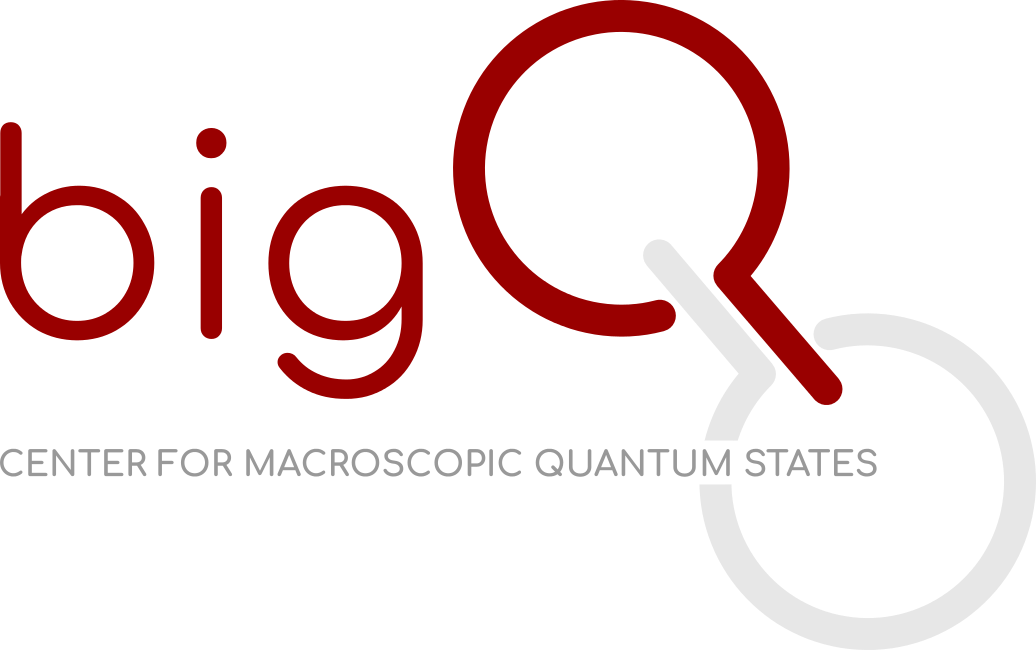

CVQC, Carlsberg Academy, September 2022


Outline (vises ikke)
hurtig squeezing intro
QPIT :heart: squeezing: Vores squeezere - fotos, performance, type, antal
hurtig project overview
multi-mode squeezing - using just one or two squeezers
show cov.matrix/Wigner efter squeezing, splitting (animation? variabel fase/sqz)
4 modes: distributed phase sensing; 1000s of modes: cluster state for MBQC
intro distributed sensing
experiment
intro cluster state generation
characterised cluster
intro MBQC
gates
Squeezed states
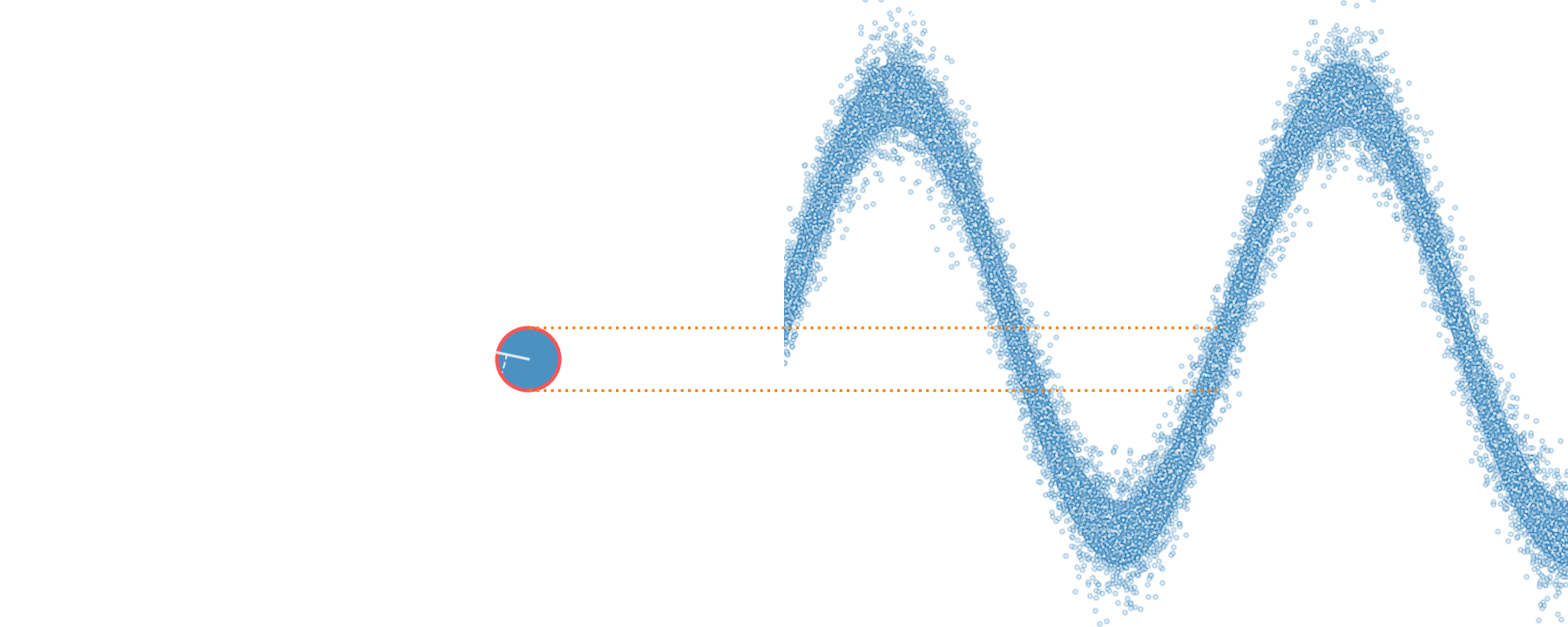
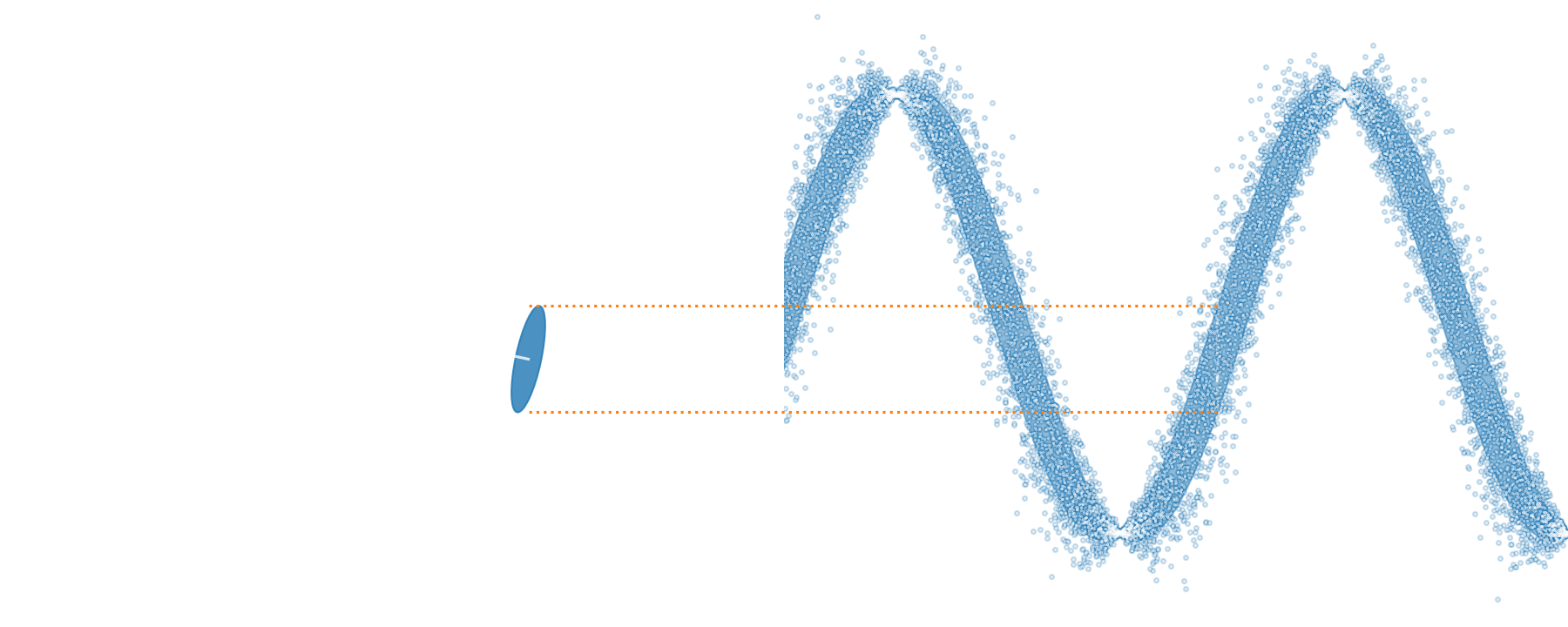
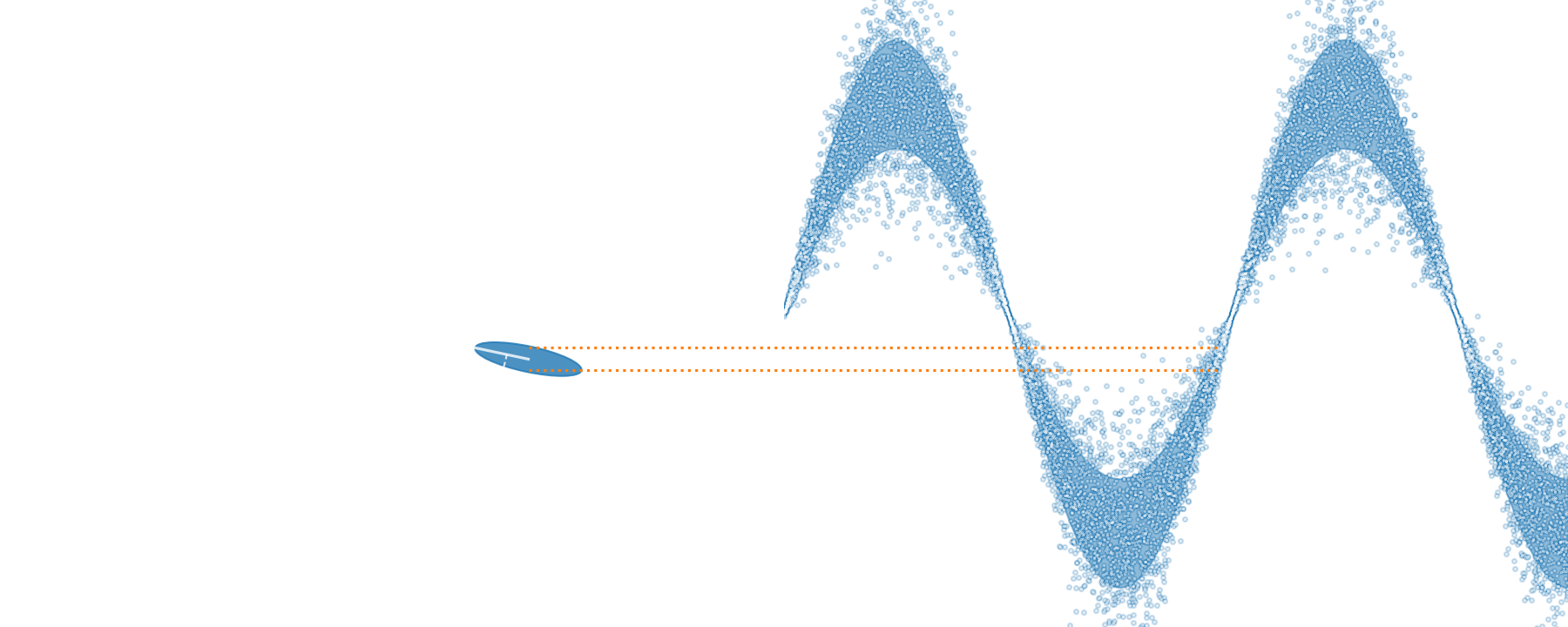
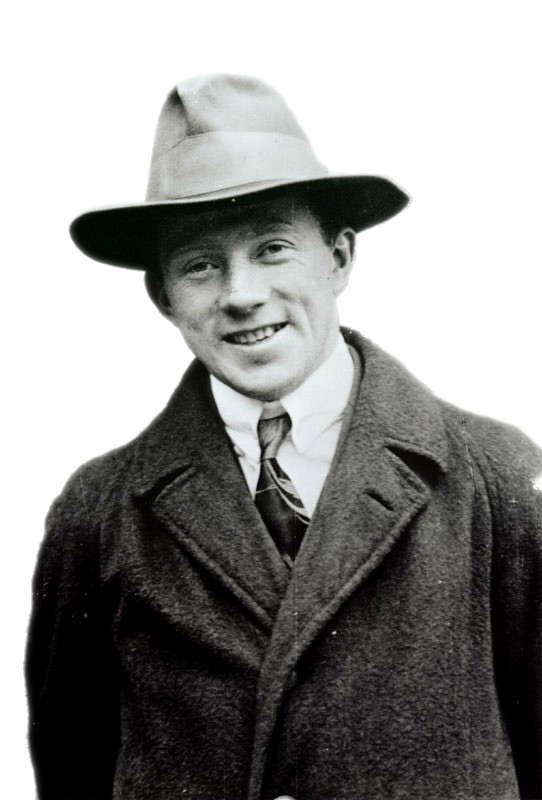
amplitude squeezed
phase squeezed
QPIT 💖️ SQUEEZING
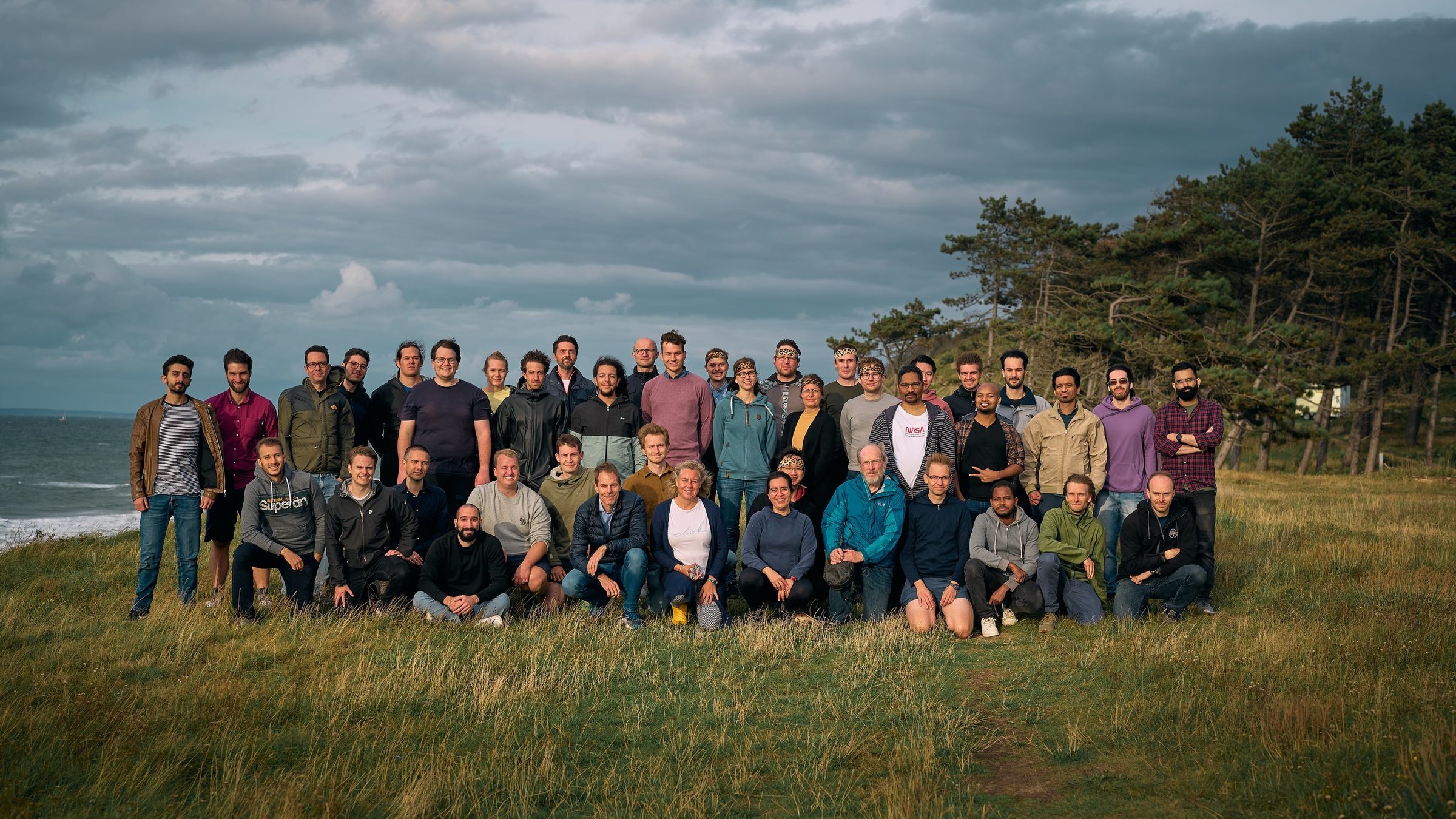



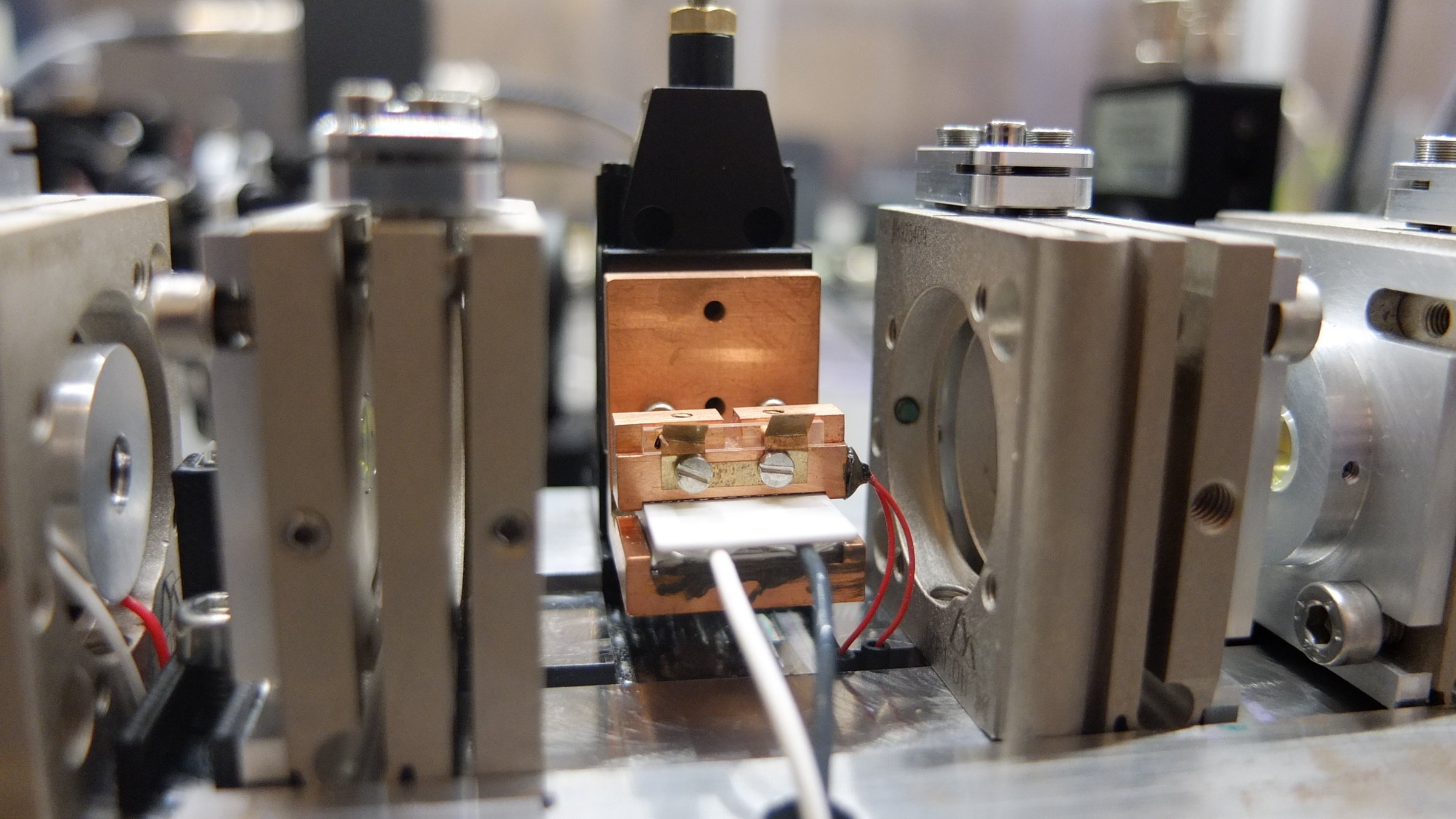
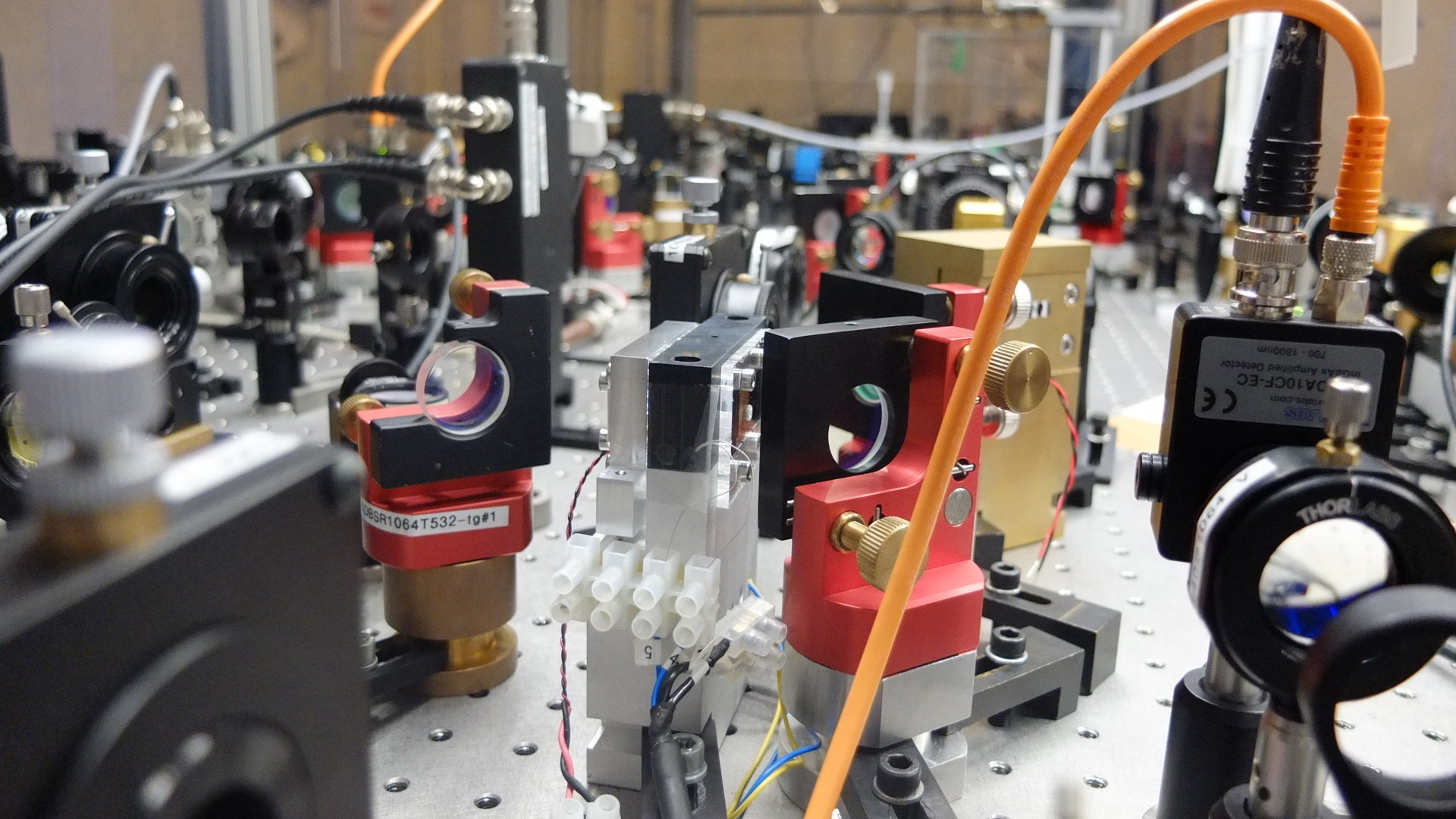
PPKTP
semi-monolithic
PPKTP bow-tie
single- or two-mode squeezing
PPLN waveguide

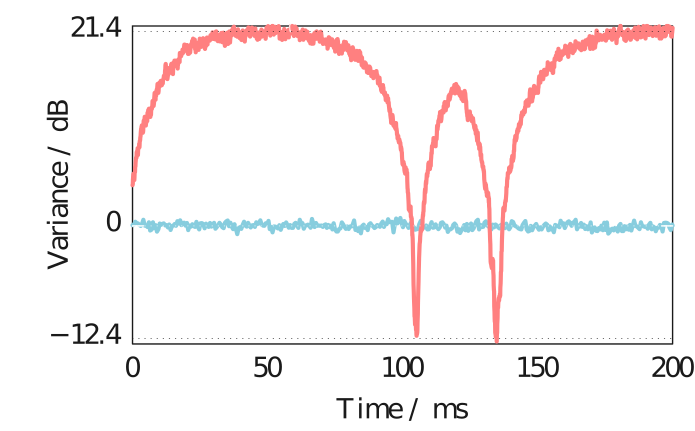
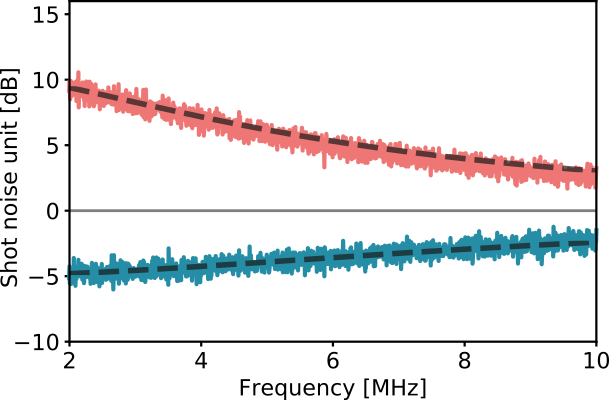



- phase sensing
- Raman spectroscopy
- entanglement witness
- integrated squeezers
- Gaussian Boson Sampling
~8 squeezers in two labs
(many more on the way)
- QKD
- teleportation
- quantum randomness
- quantum computing
4-mode squeezing
thousands-mode squeezing
POSTERS
Benjamin
Tummas
Renato
Abhinav
Distributed phase sensing
"Cheap" entanglement enhances estimation of a global parameter of spatially separated systems
X Guo, CR Breum, J Borregaard, S Izumi, MV Larsen, T Gehring, M Christandl, JS Neergaard-Nielsen, UL Andersen
Nature Physics 16, 281 (2020)
Our example
Average of multiple optical phase shifts
Small phase shifts:
Estimate with homodyne detection of phase quadrature


Task
Estimate some global property of multiple physical systems







Heisenberg scaling in probe energy and no. of sites/samples
sensitivity \(\sigma \equiv 1/SNR\)
- minimum resolvable phase shift
Realistic (lossy) situation:
Heisenberg scaling disappears but sensitivity gain remains




Experiment



Measured sensitivities
Cluster states for CV-MBQC
Universal gate set implemented by homodyne measurements on temporally encoded entangled state of 1000s of modes
(continuous-variable measurement-based quantum computing)
MV Larsen, X Guo, CR Breum, JS Neergaard-Nielsen, UL Andersen
Nature Physics 17, 1018 (2021)
MV Larsen, X Guo, CR Breum, JS Neergaard-Nielsen, UL Andersen
Science 366, 369–372 (2019)
Cluster state
graph state with regular lattice adjacency matrix \(\mathbf{A}\)

In CV:
nodes
edges
Fullfils the nullifier condition: \((\mathbf{\hat{p}} - \mathbf{A}\mathbf{\hat{x}})\ |\psi_\mathbf{A}\rangle=0\)
Finite squeezing → self-loops (non-zero, complex-valued diagonal in \(\mathbf{A}\))
Cluster state generation
- EPR states from two single-mode squeezers
- Interfere two EPR pairs
- Repeat
Use temporal domain: efficient use of resources




EPR adjacency matrix:
\(\mathbf{Z}_\mathrm{EPR} = \begin{pmatrix}i \cosh 2r & -i\sinh 2r \\ -i\sinh 2r & i\cosh 2r\end{pmatrix}\)
BS₂ induces new graph edges
\(\mathbf{Z}_\mathrm{1D}\) is not a true cluster state,
but a phase shift of \(\pi/2\) on every 2nd mode transforms it to \(\mathbf{Z}'_\mathrm{1D}\), a true (approximate) cluster state


Long delay makes nodes separated by \(N=12\) temporal modes adjacent
BS₃ now connects the graph in the second dimension






Nullifiers of the 2D graph state:
\(\hat{n}_k^x=\hat{x}_{k}^A+\hat{x}_{k}^B-\hat{x}_{k+1}^A-\hat{x}_{k+1}^B-\hat{x}_{k+N}^A+\hat{x}_{k+N}^B-\hat{x}_{k+N+1}^A+\hat{x}_{k+N+1}^B\)
\(\hat{n}_k^p=\hat{p}_{k}^A+\hat{p}_{k}^B+\hat{p}_{k+1}^A+\hat{p}_{k+1}^B-\hat{p}_{k+N}^A+\hat{p}_{k+N}^B+\hat{p}_{k+N+1}^A-\hat{p}_{k+N+1}^B\)
\(k+1\)
\(k\)
\(k+N+1\)
\(k+N\)
with variance \(\langle\Delta\hat{n}_k^{x2}\rangle=4e^{-2r_A},\quad\langle\Delta\hat{n}_k^{p2}\rangle=4e^{-2r_B}\)
The 8 modes making up the nullifiers constitute a unit cell of the graph.
Inseparability of the state

\(k+1\)
\(k\)
\(k+N+1\)
\(k+N\)
van Loock-Furusawa criterion for bipartition of \(S\):
- Define operators \(\displaystyle\hat{X} = \sum_{j\in S} h_j\hat{x}_j,\quad \hat{P} = \sum_{j\in S} g_j \hat{p}_j\)
- If \(\{h_j\},\{g_j\}\) exist such that
then \(\mathcal{S}_1\) and \(\mathcal{S}_2\) are inseparable
Periodic, so enough to show inseparability of a unit cell
Complete inseparability: any bipartition is inseparable

Task: find suitable \(\hat{X}, \hat{P}\) for all 127 possible bipartitions of the 8-mode unit cell
\(\displaystyle \langle\Delta\hat{X}^2\rangle + \langle\Delta\hat{P}^2\rangle < \Big|\sum_{j\in \mathcal{S}_1} h_j g_j\Big| + \Big| \sum_{j\in\mathcal{S}_2} h_j g_j\Big|\)

We find linear combinations of nullifiers as \(\hat{X}\) and \(\hat{P}\) for all 127 bipartitions of the unit cell
van Loock-Furusawa criterion is fulfilled if all nullifiers are squeezed by >3 dB

\(\displaystyle \langle\Delta\hat{X}^2\rangle + \langle\Delta\hat{P}^2\rangle < \Big|\sum_{j\in \mathcal{S}_1} h_j g_j\Big| + \Big| \sum_{j\in\mathcal{S}_2} h_j g_j\Big|\)
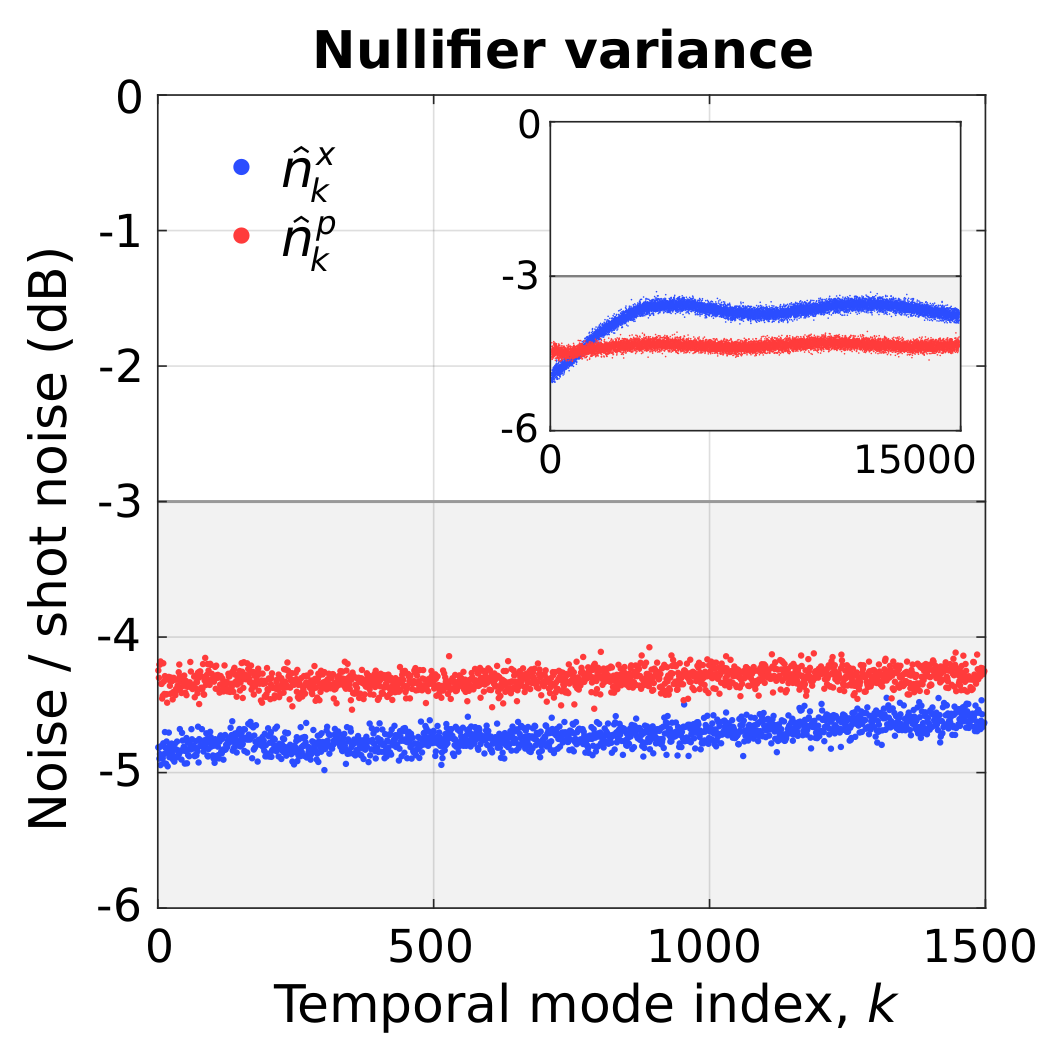

Complete inseperability confirmed for 2 × 15000 modes


To implement gates and circuits on a cluster state, it is reshaped into "wires":
Measuring a node in the computational basis removes it from the graph
Gate implementation

Computational scheme
- Wires consist of 2-mode EPR states
- Gates implemented by teleportation
- Gates determined by homodyne phases
- Simpler now to consider BS₃ as part of a joint measurement on a 1D cluster

Computational scheme
- Wires consist of 2-mode EPR states
- Gates implemented by teleportation
- Gates determined by homodyne phases
- Simpler now to consider BS₃ as part of a joint measurement on a 1D cluster

Computational scheme
\(\hat{U}=(-1)^w\hat{R}\left(\frac{\theta_{+,k}}{2}\right)\hat{S}\left(\tan\frac{\theta_{-,k}}{2}\right)\hat{R}\left(\frac{\theta_{+,k}}{2}\right)\)
\(\theta_{\pm,k}=\pm\theta_{A,k}+\theta_{B,k}\)
Implemented gate:
Computational scheme

\(\hat{U}=(-1)^w\hat{R}\left(\frac{\theta_{+,k}}{2}\right)\hat{S}\left(\tan\frac{\theta_{-,k}}{2}\right)\hat{R}\left(\frac{\theta_{+,k}}{2}\right)\)
\(\theta_{\pm,k}=\pm\theta_{A,k}+\theta_{B,k}\)
Single-mode gates
\(\mathbf{\hat{q}'} = \mathbf{U \hat{q}} + \mathbf{N\hat{p}_i} + \mathbf{Dm} \)
Side effects of the gate teleportation:
Noise from finite squeezing
- achilles heel of CV-MBQC!
Measurement outcome-dependent displacement
- can be treated in post-processing

Both \(\mathbf{U}\) and \(\mathbf{N}\) can be characterised by gate tomography
- use correlations between output and reference input (entangled with input)
\(\hat{U}=(-1)^w\hat{R}\left(\frac{\theta_{+,k}}{2}\right)\hat{S}\left(\tan\frac{\theta_{-,k}}{2}\right)\hat{R}\left(\frac{\theta_{+,k}}{2}\right)\)
\(\theta_{\pm,k}=\pm\theta_{A,k}+\theta_{B,k}\)
Implemented single-mode gates


Rotation
\(\hat{U}=(-1)^w\hat{R}\left(\frac{\theta_{+,k}}{2}\right)\hat{S}\left(\tan\frac{\theta_{-,k}}{2}\right)\hat{R}\left(\frac{\theta_{+,k}}{2}\right)\)
\(\theta_{\pm,k}=\pm\theta_{A,k}+\theta_{B,k}\)
Implemented single-mode gates
Shear


- actually \(\hat F^j\hat P(\sigma)\) since \(\hat P(\sigma)\) cannot be done in one step
\(\hat{U}=(-1)^w\hat{R}\left(\frac{\theta_{+,k}}{2}\right)\hat{S}\left(\tan\frac{\theta_{-,k}}{2}\right)\hat{R}\left(\frac{\theta_{+,k}}{2}\right)\)
\(\theta_{\pm,k}=\pm\theta_{A,k}+\theta_{B,k}\)
Implemented single-mode gates
Squeezing


Two-mode gate

\(\lbrace\hat{R}(\theta),\hat{S}(e^r),\hat{C}_Z(g)\rbrace\)
is a universal multi-mode Gaussian gate set.
source:

\(\lbrace\hat{F}=\hat{R}(\pi/2),\hat{P}(1),\hat{C}_Z(g)\rbrace\)
is a multi-mode Clifford gate set for GKP-encoded qubits
A few other recent results
Steering-based randomness certification with squeezed states and homodyne measurements
Marie Ioannou, Bradley Longstaff, MV Larsen, JS Neergaard-Nielsen, UL Andersen, D Cavalcanti, N Brunner, JB Brask, arXiv:2111.06186
Deterministic quantum phase estimation beyond the ideal NOON state limit
Jens AH Nielsen, JS Neergaard-Nielsen, T Gehring, UL Andersen, arXiv:2111.09756



40 km fiber transmission of squeezed light measured with a real local oscillator
Iyad Suleiman, JAH Nielsen, X Guo, N Jain, JS Neergaard-Nielsen,
T Gehring, UL Andersen, arXiv:2101.10177


Casper R. Breum
Xueshi Guo
Casper R. Breum
Xueshi Guo
Mikkel V. Larsen
Mikkel V. Larsen